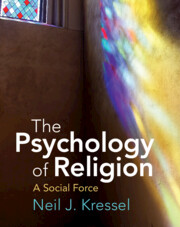Book contents
- The Psychology of Religion
- The Psychology of Religion
- Copyright page
- Contents
- Detailed Contents
- Preface
- Acknowledgments
- Part One Introduction
- Part Two The Great Theorists
- Part Three How Psychologists Study Religion
- Part Four How People Think About and Experience Religion
- 6 Religious Attitudes and Beliefs Around the World
- 7 Religious Development, Religious Experience, and Prayer
- Part Five The Effects of Religion
- Part Six Using the Psychology of Religion and Spirituality
- References
- Index
- References
7 - Religious Development, Religious Experience, and Prayer
from Part Four - How People Think About and Experience Religion
Published online by Cambridge University Press: 01 November 2024
- The Psychology of Religion
- The Psychology of Religion
- Copyright page
- Contents
- Detailed Contents
- Preface
- Acknowledgments
- Part One Introduction
- Part Two The Great Theorists
- Part Three How Psychologists Study Religion
- Part Four How People Think About and Experience Religion
- 6 Religious Attitudes and Beliefs Around the World
- 7 Religious Development, Religious Experience, and Prayer
- Part Five The Effects of Religion
- Part Six Using the Psychology of Religion and Spirituality
- References
- Index
- References
Summary
Although people may – as some psychologists argue -- be born with a tendency to become believers, specific religious traditions are cultural products that must be acquired through learning and socialization. In addition, religious beliefs and behaviors take on different meanings at different ages. This chapter starts with a discussion of religious socialization and the developmental psychology of religion. The chapter includes a detailed section on religious socialization in summer camps. Next, we examine the large body of research on the psychology of prayer. Psychologists of religion argue that even if prayer involves some matters beyond the reach of science, important aspects of the prayer experience can be addressed using good scientific practice. T. M. Luhrmann’s important work is considered in some detail; she argues that, ultimately, through prayer, religious believers start to experience part of their own minds as the presence of God. The chapter concludes with two comprehensive sections on: (1) religious and mystical experiences and (2) identity and religion. For some people, religious identity is closely tied to ethnic, racial, national, professional, and familial identities; indeed, religious identity may be derived from these other identities.
Keywords
- Type
- Chapter
- Information
- The Psychology of ReligionA Social Force, pp. 267 - 316Publisher: Cambridge University PressPrint publication year: 2024

